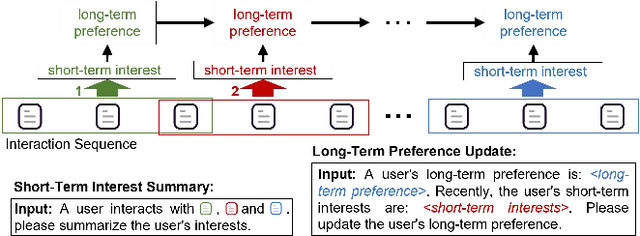Guangping Zhang
Bidirectional Knowledge Distillation for Enhancing Sequential Recommendation with Large Language Models
May 23, 2025Abstract:Large language models (LLMs) have demonstrated exceptional performance in understanding and generating semantic patterns, making them promising candidates for sequential recommendation tasks. However, when combined with conventional recommendation models (CRMs), LLMs often face challenges related to high inference costs and static knowledge transfer methods. In this paper, we propose a novel mutual distillation framework, LLMD4Rec, that fosters dynamic and bidirectional knowledge exchange between LLM-centric and CRM-based recommendation systems. Unlike traditional unidirectional distillation methods, LLMD4Rec enables iterative optimization by alternately refining both models, enhancing the semantic understanding of CRMs and enriching LLMs with collaborative signals from user-item interactions. By leveraging sample-wise adaptive weighting and aligning output distributions, our approach eliminates the need for additional parameters while ensuring effective knowledge transfer. Extensive experiments on real-world datasets demonstrate that LLMD4Rec significantly improves recommendation accuracy across multiple benchmarks without increasing inference costs. This method provides a scalable and efficient solution for combining the strengths of both LLMs and CRMs in sequential recommendation systems.
Enhancing LLM-Based Recommendations Through Personalized Reasoning
Feb 19, 2025



Abstract:Current recommendation systems powered by large language models (LLMs) often underutilize their reasoning capabilities due to a lack of explicit logical structuring. To address this limitation, we introduce CoT-Rec, a framework that integrates Chain-of-Thought (CoT) reasoning into LLM-driven recommendations by incorporating two crucial processes: user preference analysis and item perception evaluation. CoT-Rec operates in two key phases: (1) personalized data extraction, where user preferences and item perceptions are identified, and (2) personalized data application, where this information is leveraged to refine recommendations. Our experimental analysis demonstrates that CoT-Rec improves recommendation accuracy by making better use of LLMs' reasoning potential. The implementation is publicly available at https://anonymous.4open.science/r/CoT-Rec.
Enhancing Cross-Domain Recommendations with Memory-Optimized LLM-Based User Agents
Feb 19, 2025Abstract:Large Language Model (LLM)-based user agents have emerged as a powerful tool for improving recommender systems by simulating user interactions. However, existing methods struggle with cross-domain scenarios due to inefficient memory structures, leading to irrelevant information retention and failure to account for social influence factors such as popularity. To address these limitations, we introduce AgentCF++, a novel framework featuring a dual-layer memory architecture and a two-step fusion mechanism to filter domain-specific preferences effectively. Additionally, we propose interest groups with shared memory, allowing the model to capture the impact of popularity trends on users with similar interests. Through extensive experiments on multiple cross-domain datasets, AgentCF++ demonstrates superior performance over baseline models, highlighting its effectiveness in refining user behavior simulation for recommender systems. Our code is available at https://anonymous.4open.science/r/AgentCF-plus.
Simulating News Recommendation Ecosystem for Fun and Profit
May 23, 2023



Abstract:Understanding the evolution of online news communities is essential for designing more effective news recommender systems. However, due to the lack of appropriate datasets and platforms, the existing literature is limited in understanding the impact of recommender systems on this evolutionary process and the underlying mechanisms, resulting in sub-optimal system designs that may affect long-term utilities. In this work, we propose SimuLine, a simulation platform to dissect the evolution of news recommendation ecosystems and present a detailed analysis of the evolutionary process and underlying mechanisms. SimuLine first constructs a latent space well reflecting the human behaviors, and then simulates the news recommendation ecosystem via agent-based modeling. Based on extensive simulation experiments and the comprehensive analysis framework consisting of quantitative metrics, visualization, and textual explanations, we analyze the characteristics of each evolutionary phase from the perspective of life-cycle theory, and propose a relationship graph illustrating the key factors and affecting mechanisms. Furthermore, we explore the impacts of recommender system designing strategies, including the utilization of cold-start news, breaking news, and promotion, on the evolutionary process, which shed new light on the design of recommender systems.
 Add to Chrome
Add to Chrome Add to Firefox
Add to Firefox Add to Edge
Add to Edge